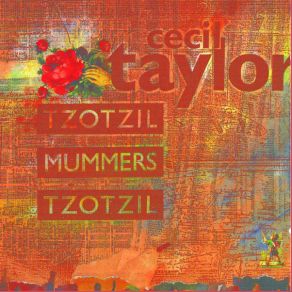Tzotzil / Mummers / Tzotzil
Download links and information about Tzotzil / Mummers / Tzotzil by Cecil Taylor. This album was released in 1990 and it belongs to Jazz, Avant Garde Jazz, Avant Garde Metal genres. It contains 1 tracks with total duration of 55:43 minutes.

|
|
|---|---|
| Artist: | Cecil Taylor |
| Release date: | 1990 |
| Genre: | Jazz, Avant Garde Jazz, Avant Garde Metal |
| Tracks: | 1 |
| Duration: | 55:43 |
| Buy it NOW at: | |
| Buy on iTunes $9.99 | |
Tracks
[Edit]| No. | Title | Length |
|---|---|---|
| 1. | Tzotzil / Mummers / Tzotzil | 55:43 |
Details
[Edit]This is perhaps one of the oddest recordings that Cecil Taylor did for Leo. It begins, simply enough, with him reading his oblique, nearly totally incomprehensible poetry — which doesn't make it bad — then his band enters and he takes it out with some of the rhythm section accompanying him as he reads some more. Simple enough right? All except for the fact that the music was recorded three days before any of the vocals were, and in a different country. The poetry was recorded England and the music three days earlier in Paris. Ok, weirdness aside (and it is weird hearing Taylor's voice multi-tracked), the band is stellar: Leroy Jenkins on violin, William Parker on bass, Thurman Barker on marimba and drums, Carlos Ward on reed, and, of course, Taylor on piano. The musical aspect of this work begins not with Taylor (seems the spoken intro was his first solo), but with Leroy Jenkins playing what resembles a repetitive theme underscored by Parker's two octave down bassing. Taylor and Barker (who is on marimba at this point) alternate chords and rhythms. Carrying on a series of runs and counterpoint soling as Jenkins moves off the theme into the outer reaches of his violin's sound world. Ward doesn't enter the fray until almost 15 minutes have passed. And when he does, it's with all manner of the reed family. Beginning in a support capacity, he doesn't get the chance to let it burn in the fray for almost 10 more minutes. And now, at halfway through this glorious cacophony, this ensemble knows where to go. Taylor is leading the charge and all of these players know how to follow him, down an improvisatory highway that leads straight into a darkness beyond language. And perhaps, as he re-enters with his poetry at the very end of the work, that's what it's about anyway, going beyond language, ever beyond the place where it occurs to the place where it is conceived in spoken word and in music, which is but an extension of the human voice.